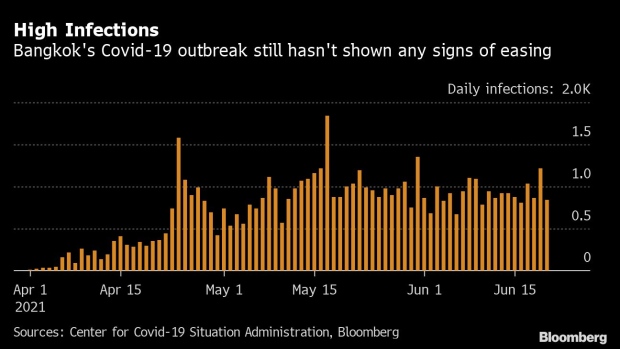Jun 21, 2021
Thailand’s Pro-Democracy Protesters Are Returning to the Streets
, Bloomberg News

(Bloomberg) -- Protesters in Thailand plan to return to Bangkok’s streets on Thursday, reviving a pro-democracy movement after a six-month lull during two waves of Covid-19 outbreaks.
At least four groups of anti-government activists have called for separate gatherings to demand the resignation of Prime Minister Prayuth Chan-Ocha and to commemorate the June 24, 1932 Siamese Revolution, which ended absolute monarchy in Thailand. The Metropolitan Police Bureau has cautioned them against staging demonstrations.
In the first major demonstrations since the hiatus, key youth groups are expected to join the gatherings on Thursday in several locations across the capital, Bangkok. Dozens of protesters already face charges including sedition and insulting the monarchy, which carry sentences as long as 15 years. Out of more than 20 activists who were detained awaiting trials, two remain in jail, according to the Thai Lawyers for Human Rights database.
“Protesters will not only act against the law, but they will also face a high risk of infections and may further spread the virus to others, worsening the outbreak situation. We’re urging all protesters to refrain from gatherings,” Piya Tawichai, the police bureau’s deputy commissioner said on Monday. “Protesters may get some benefits from these political gatherings, but the country will suffer.”
The return of large-scale protests in the capital Bangkok risks upending the government’s plan to reopen the country as early as October for tourism, a sector key to putting the economy on the path to recovery. The spread of infections amid a low vaccination rate could also lead to more hospitalizations and deaths, especially in Bangkok, the epicenter of the current outbreak.
The anti-government movement began gaining momentum in mid-2020, reaching its peak late last year when hundreds of thousands of demonstrators joined calls for the government’s resignation and for increased transparency and accountability from the monarchy. Protest leaders plan to draw fresh support from people frustrated with the government’s handling of the outbreaks and vaccine rollout to revive the movement.
All large gatherings, as well as activities that may lead to the spread of infections and unrest, are prohibited under the Covid control measures, police said, adding that organizers may face up to two years in prison. Since July last year, the police said they have pursued about 150 cases against activists.
©2021 Bloomberg L.P.






